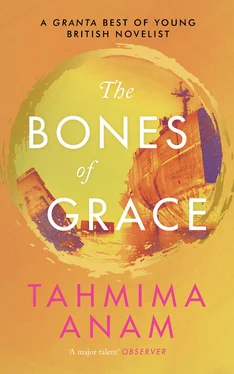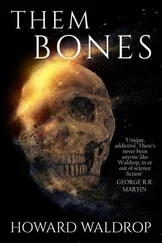‘So tell me again,’ you said, putting your hands into your pockets and leaning back on your heels. ‘About your boyfriend.’
‘There’s nothing to say, really,’ I said, taking the suitcase from you and starting to walk again. ‘He’s lovely.’
‘How does he feel about new friends?’
I imagined how I would describe our meeting to Rashid without making it sound as if I had done something wrong, which I hadn’t. Not yet. I thought about the ease with which I had just entered your home. I had, since arriving in this country, assumed an air of being able to float seamlessly from place to place: a grateful guest at Thanksgiving dinner, a girl from far away who understood everyone’s jokes because her English was so good. It was better to render my difference invisible, brush over the small discomforts I occasionally felt, always too cold in the spring when everyone wore T-shirts, occasionally emphasising a syllable (I once mispronounced ‘intestine’, making it sound like ‘Lichtenstein’ to a table full of laughing Americans). You held me in a very tight gaze now, in a way I don’t believe I had ever been looked at, and I found myself struggling to speak, and still I believed there was nothing for me to regret or be ashamed of, because, though the feeling had the intensity of being sexual, it was something altogether different — not a churning but a quieting, as if I were being put back together, piece by piece. I felt the sidewalk burning beneath the soles of my feet, and the sun high and bright above, and, thus framed by a day that seemed to stretch over my whole life, I declared to myself that you were the best friend I’d ever had.
‘What should we do next?’ you said.
‘We should go and look at the Glass Flowers.’ I’d had the idea in the kitchen at your mother’s, and I was hoping it would be a new discovery for you, even though your tenure in this town had been far longer than mine.
You paused for a moment, then exclaimed: ‘Oh, the Glass Flowers! My grandmother used to take me. Did I tell you that? How did you know?’
I was thrilled. ‘I took a chance.’
We went back down Mass Ave, stopping for a pizza at Hi-Rise Bakery. All my clothes were sticking to my skin. I complained and you bought me an ice lolly from a convenience store. When we reached Kirkland I relaxed — this was where I was most comfortable, among the red-brick buildings, the courtyards and the small, triangular gardens.
The receptionist at the Museum of Natural History gave us two small metal pins to attach to our lapels. I led the way up the stairs to the top floor. ‘I want to show you something,’ I said ‘before we see the glass flowers.’ We went through the displays, past the ancient Rhino and the Glyptodont . We paused in front of the domed shell of Stupendemys geographicus , the giant tortoise, and I told you the story of how it had been transported in pieces. In the Vertebrate room I led you to the giant glass cabinet that held Kronosaurus . I’d seen it many times before, and I knew its murky history — that what we were looking at was probably an incorrect reconstruction, but it always took my breath away — something about the whole swimming reptile, all the way from its enormous maw to its pelvis to the articulated bones of its fins. I held out my hand with a flourish. You read the caption. ‘So this is what you’re up to,’ you whispered. ‘One-upping this guy.’
‘Something like that.’
The glass flowers sprang up from inside the display cabinets as if they had just been cut out of a field. Tiny filaments of wire held the petals and stems together. Without context, they sat like silent pearls in the felted hush of the museum.
‘I haven’t been since I was a kid,’ you said. You read the plaque, illuminated by a small lamp attached to the wall. ‘Leopold and Rudolf Blaschka.’
‘Father and son. It took them almost fifty years.’ I had forgotten how much they were about sex. Stamens and ovaries and modes of reproduction. And they were bigger than I remembered.
I considered telling you that you were taking something away from me right now, standing there with your fingers wrapped around the handle of my suitcase, staring at the glass cactus as though the pink flower blossoming from its side were some sort of miracle. I considered telling you my parents liked to tell stories that would make them feel better about the adoption, for example, that I resembled my maternal grandfather, whom I had never met, that I had his height and his small eyes, which made me look a little Mongolian, and his curly hair. There was an old joke in the family that my grandfather was descended from Genghis Khan. I had never heard anyone tell this joke apart from my parents, who forced a couple of laughs out whenever they said it, and then looked at each other and willed the whole thing to be true. Then I turned nine, and they confessed everything, and by then I was old enough to know we would never speak of it again. But I didn’t say anything like that. Because, for the first time I could remember, I didn’t care where or who I came from. I didn’t care if I was an amphibian or a member of an in-between species because I belonged here, in this moment, with these fragments of moulded glass, and little else mattered.
On the way down, you stopped on the second floor and leaned against the banister.
‘So now you’ve seen the Glass Flowers,’ I said. ‘Again.’
‘I don’t want to say goodbye.’
I thought about the night I had lost my virginity, Rashid sneaking into my bedroom while my parents were at work, the ceiling fan muffling our sounds, the way my knees felt wobbly for days afterwards, the guilty, exhilarated glances we had given each other in school the next day.
‘I would like to see you every day,’ you said.
‘I’m leaving on Friday.’
‘That’s ages away.’ You were holding your hands wide apart to indicate the vast amount of time between now and then. I worried if I spent another minute there, on those steps, with you, I would be rooted for ever, that I might live and re-live this moment for the rest of my life. ‘We’ve got tomorrow, and the day after,’ you said. ‘And on Friday I’ll take you to the airport.’
In all my years in America, no one had ever taken me to the airport. Or picked me up. Bettina had offered, but I had always said no, not minding as I passed through the arrivals gate without scanning the crowd for a familiar face. I’d had a twenty-hour plane ride to morph into an anonymous student, landing at Logan Airport along with the Argentinians and the Koreans, getting our bags checked in case we’d attempted to smuggle in Mama’s dulce de leche or kimchee. And when I departed, I took the T and then the Silverline. I banked on the fact that no one would miss me, that there were people on the other side to whom I mattered more. So when you offered to take me to the airport, because I had spent years in this country without allowing that sort of intimacy to blossom, and because I was leaving now, probably only to return once, I threw up my arms and said, ‘okay,’ for the first time in seven years not wishing I was somewhere else.
The next morning we met at the Science Center and walked again to the diner. We ate the same sandwiches. You confessed to an addiction to coffee, I an addiction to chips. By chips, I said, I mean French fries. The space yawned and narrowed between us like an accordion. We shared a love of Russian literature, and, recently, Shostakovich. I confessed I was a fan of Buffy the Vampire Slayer , and you replied that your childhood was bereft of television, sugar, and most forms of processed food. You said the house in Vermont had no running water or electricity. I told you my ancestors had worked very hard to get running water, thank you very much. I drew a parallel with the whale, saying, you white Americans, going backwards into the sea when everyone else is happy to be on dry land. Ah, but your fascination with the whale suggests you see the benefits of bucking history, you countered. I smiled at that. You said again that you would very much like to see where I had grown up. And I wondered what I would ever do with you if I did take you home. There was a reason I had chosen Rashid, and that reason sat inside me like a stone. I was thinking now that you would say something about your grandmother, but you didn’t, and I had no idea if this was the way people displayed grief in your family, by making new friends and laughing and showing them sandwiches. Falling in love and calling it friendship.
Читать дальше












